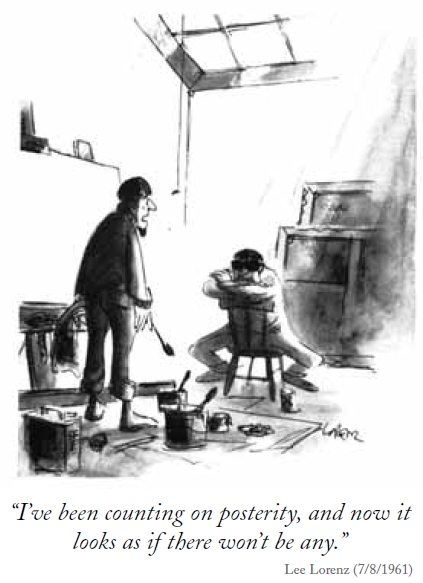Posterity
Notwithstanding the absence of a soul, we all go on into the future (and perhaps eternity) by the mark we each leave in the arrangement of the present; because the future is exquisitely sensitive to the past and to the present.
Every day each of us changes the future in many subtle ways and everyone (perhaps every living thing) leaves their mark.
Consider first the mighty. What might have happened if Alexander the Great, Napoleon or Hitler had not been born? History would obviously be quite different.
But they did not act in isolation Hitler, for example, was heavily influenced by Wagner and Nietzsche; in turn influenced by the ideas of Byron. Had Byron not been disgraced by his jealous cousin and fled England to Europe, the Nazis may never have risen to power. Byron’s own birth was problematical; and so it goes.
The briefest acquaintance with history demonstrates the subtleties of inputs and timing to important decisions made; perhaps through the possession of erroneous information; as a result of an accidental meeting; or a perceived insult. Everyone in the environment has an impact; the cabbie who was late; the blacksmith that caused the horse to throw a shoe; the maid who spilled the tea. Had any one of these not been born or in that place, at that time, the future would have been different. Those who leave ideas, insights or discoveries behind have even more influence. Consider Copernicus, Galileo, Newton, Darwin or Einstein.
Now consider the accident of your own birth. Everyone has perhaps billions of unborn siblings. Most women have around 300 thousand follicles at puberty and depending on the circumstances of their lives about 400 of these will become eggs that could potentially be fertilised to become a unique child. Each man produces between forty and fifty million subtly different sperm per ejaculation. Every one of these potential combinations of egg and a sperm will produce a different sibling. But of course, not even the most promiscuous woman will fall pregnant at every available opportunity. Which egg is fertilised by which man and which sperm is a great lottery.
The woman’s choice from her available partners, and the exact timing of the events leading to a pregnancy, is critical to the outcome, as are physiological and emotional factors that help determine a successful fertilisation; which sperm succeeds and if the pregnancy goes to term.
Thus, the fact that you are here; and not your potential but unborn sibling; is ‘a billion to one chance’. And so it was for anyone in history. Indeed if any of the many people who influenced your parents to copulate the instant they did had not been born (friends, a concierge, waiter, cab driver, actor, chef, song writer), nor would you have been. I acknowledge the influence of Hitler, Churchill, the Wright Brothers, Einstein and 40’s movies on my parents for my existence.
The decisions you take every day inevitably help determine the future of the yet unborn. If you happen to be a Byron these changes will be more devastating but the outcomes may not be any better.
It has been argued that demonstrating that there is no soul removes the consequences of being good or evil; that if others are persuaded to believe this they will feel free to commit immoral acts because they will fear no ultimate retribution.
Morality is a mode of behaviour that you learn at your mother’s knee; acceptance of civil law; the outcome of an accepted social contract; neither has anything to do with ancient religious mores.
Divine retribution is unnecessary to enforce contemporary mores and indeed our sense of morality is often offended by things we read in ancient teachings. We no longer approve of slavery nor deny equality to women. We believe that treating children or women as property is wrong. The Jewish uprising in AD 66 began when Greeks sacrificed birds in front of a local synagogue. Tens of thousands died. Why would you take such teachings seriously in the 21st Century?
To reiterate, each of us is constantly changing the future: posterity.
As the only presence you will have, beyond your death, is posterity, there is a strong incentive to be well remembered.
Perhaps you can discover new knowledge, invent something or leave something else worthwhile. Maybe you can become famous?
But extraordinary achievement is relative and therefore not available to everyone. An achievement's no longer extraordinary if almost everyone can do it. Nor is fame universally desired.

Most of us will be very content to be well remembered by our friends and community; to positively influence our children and grandchildren’s development; or alternatively, perhaps, to abjure from having children at all; and through our contributions to a community or civil society, support those of others.
On the other hand, no one concerned with posterity wants to be reviled as evil or remembered as a destroyer of the achievements; or the lives of others. Posterity does not offer forgiveness for these sins.
